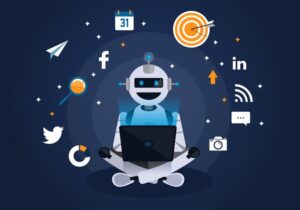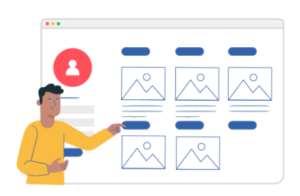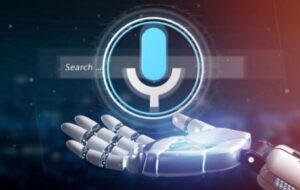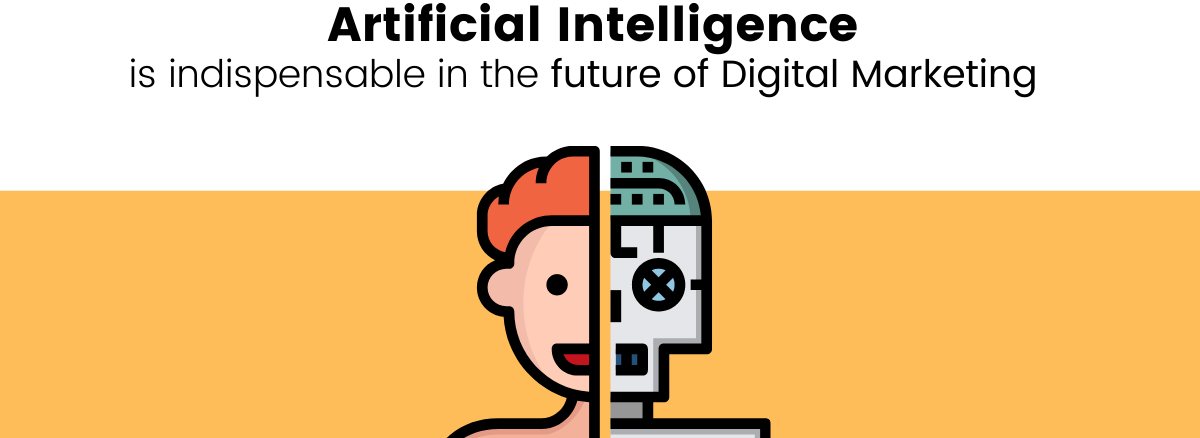- November 15, 2021
- Bunjy
- Comment: 0
- Digital Marketing, Tips and Tools
AI has been the talk of the town for a while. This is mainly because it influences digital marketing strategies to help you achieve enhanced customer adventures. But, more than that, it enables you to save ample time.
Before diving deep into its impact on Digital Marketing, let us first shed some light on the fundamentals.
What is Artificial Intelligence
In simple words, AI empowers a machine’s ability to think, respond and perform just like humans. But, it isn’t just limited to that. It also helps machines learn by experience and adjust to newer situations or inputs to increase accuracy and minimize human errors to carry out any task efficiently.
However, Artificial Intelligence was a term that was once open to multiple interpretations, but since its precedence, it has only taken the world of Digital Marketing by storm. Today, AI has become the front-end of technology, a determining factor for many industries success. With exceptional results, Digital Marketers no longer find it ambivalent; instead have embraced the tech.

Research commissioned by SalesForce back in 2018 says a whopping 84% of Marketers have already embraced AI in their Digital Marketing system, which helped them achieve better conversion and user experiences.
Now, let us take a closer look at the Future of Digital Marketing with Artificial Intelligence.
Enhanced User Experience
Artificial Intelligence is revolutionizing the digital landscape of Marketing with its exceptional ability to analyze data and learn from it. AI mirrors how humans think to deliver a personalized user experience. And a great user experience is what determines the success of a Digital Marketing Campaign, where prospects can resonate with the content to become your future customers. Digital Marketers can get to analyze AI-generated data to determine the most relevant content for their target audience.

For example, factors such as user’s history and past location can recommend the most valuable content for users. Also, an example of this inclination can be seen in online shopping sites where users can find relevant products based on recent purchases and searches. Precisely that is artificial intelligence doing the work.
AI-Powered Chatbots

Resolving customer queries and problems is what drives customer support. And to reduce the workload and provide a faster response to customers, many organizations use chatbots to administer general customer queries and provide prompt replies any time of the day. For example, chatbots are often programmed to offer answers to customers’ FAQs, but human agent intervention comes if the question is beyond AI’s perception. This leads to better customer service by reducing the time and lifting the agents’ workload and helps agents shift their focus on responses that require a more personal approach. In addition, Chatbots successfully enable users to drive through with the right level of professional assistance for their business.
Chat GPT is one of the most advanced language models available and can be used for chatbot development to provide fast and accurate responses to customer queries. Other examples of chatbots used for customer support include:
IBM Watson Assistant: This chatbot uses natural language processing and machine learning to provide personalized and contextual responses to customer queries.
Amazon Lex: This chatbot can be integrated with Amazon Web Services to provide natural language understanding and automatic speech recognition capabilities for customer support.
Overall, these chatbots and others like them can help organizations improve their customer service by providing prompt and accurate responses to customer queries and reducing the workload of human agents.
Optimized Email Marketing
Personalization, as established earlier, is pivotal in Digital Marketing. With the help of AI, brands can run personalized email marketing campaigns to keep customers/clients intact. Moreover, creating engaging content and relevant emails by incorporating historical user data and product recommendations remains constructive and a successful recipe for marketing campaigns. An AI-powered email marketing campaign comprises personalizing customer experiences, responding to client interplays, and reaching more leads during decisive times using optimal channels.

In addition, AI is more reliable in assisting users in deciding suitable designs, images, more compelling content and keywords that would provide better results during campaigns. Moreover, the desired process can be carried out with a single click. Also, any brand can leverage artificial intelligence in email marketing to pick the right moment for the right user for delivering the right message.
Robust Business Intelligence

Market competitiveness seems to be rapidly growing in today’s reality; brands need to figure out a compelling strategy to kindle customers’ interest and hold them together to improve their sales and business dramatically. With too many options on the table, it is critical to stay ahead, and that’s when Business Intelligence packs a punch for Digital Marketing. AI-powered Business Intelligence for digital marketing enables a suitable algorithm for businesses to track purchases, view sales statistics, and predict future behaviour, to achieve the best conversions. However, a human effort can take months to do this. So, as AI analysis in Business Intelligence is ingested, the business models commence a continuous loop of learning and adjusting to different testing circumstances to deliver accurate results than traditional BI models within a shorter time. This empowers businesses with quality data-driven marketing insights to attract ideal prospects and classify them based on the company’s target.
A Cameo in Content Marketing
Content curation is the most uphill task, especially when you are in demand to consistently find, annotate and share the most relevant and highest quality of content for your target audience. And the rules are not definitive when it comes to Content Marketing as they keep changing every year – the usual blogs have gone extinct, while the new ones are elaborate and target-specific. With that being said, Artificial Intelligence acts as a helping hand for Digital Marketers to interpret the ever-changing realm of Content Marketing by analyzing user data and user intent for better content suggestions. Moreover, an effective Content Marketing strategy provides better social media traction that allows your audience to trust your brand and advice, eventually creating a positive impression. As a result, your brand builds meaningful relationships with customers.
Also, AI can create personalized content faster than a human to scale up content marketing. For example, it can speed up and optimize your content to generate captivating news, stories and reports in a matter of seconds that would take writers hours or days to create.
Artificial Intelligence in any sector can be intimidating, but if it isn’t your cup of tea yet, you are already falling behind. Furthermore, by overlooking the countless possibilities attributed to AI, you are sure to fall behind your competitors in a world that massively relies on technology.
Get in touch with Bunjy Digital to learn more about Digital Marketing and the impact of AI in Digital Marketing.

